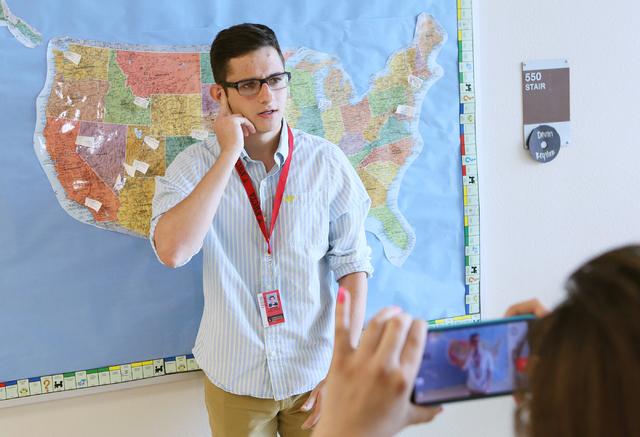Students learn crisis management through staged zombie apocalypse

Dark skies filled with rain, lighting and roars of soft thunder set the perfect stage for the emergency broadcast updates shown at the Northwest Career & Technical Academy on May 18.
The school was on lock-down after being exposed to “ZAWKS,” fictitious bacteria that causes zombie-like symptoms.
“We’ve eliminated the traditional classroom setting for a day,” said David Philippi, the school’s community partnership coordinator. “This is a good team-building exercise, not just for the students but for the teachers as well.”
The bacteria, named by combining “zombie” and “hawks,” the school’s mascot, was used to engage students through a problem-based learning activity.
“This started as a joke between friends,” said Susan McGivney, math teacher and department chair. “When I pitched the idea, admin decided that the whole school should get involved. After the Ebola outbreak, we realized that this was something that could theoretically happen. It prepares students for real-life situations.”
Setting the stage was Clark County Museums administrator Mark Hall-Patton, who visited the school a few days before the event.
“He was our patient zero,” Philippi said.
Students were told that the local resident experienced an earthquake while visiting the Nevada Test Site on May 14.
The day after visiting the school, Hall-Patton fell ill while dining. It is suspected that he was exposed to ZAWKS when he was at the Nevada Test Site and has potentially introduced the highly infectious bacteria to the school.
The teacher education and early childhood programs set their problem as if they were at the hotel where Hall-Patton fell ill and had to help maintain order during the quarantine. The culinary and hospitality students addressed their situation aboard a cruise ship with a focus on three main issues: customer service, food and customer relations.
As emergency broadcasts were shown throughout the day, students were given jobs to combat the infectious disease.
Students who were part of the ZAWKS army were given a sample set of interrogation questions and were sent to classrooms to find out who had been infected.
Medical students were assigned to quarantine areas of the school and worked to analyze how ZAWKS spreads by studying the fake symptoms of patients.
In order to avoid spreading the infection, mechanical technology students were sent to turn off the air conditioning unit.
Students were also chosen to serve as the school’s government officials for the day to decide how the government should handle the situation, including what information should be released and what shouldn’t.
Outside in the rain were the engineering and design and construction management students working on rebuilding the infrastructure that had fallen apart as a result of the earthquake.
“This has taught me to adapt to different types of situations and how to work with different people through teamwork,” said Jake Cray, 17.
“The experience has also helped us with real-life problems,” said Faith Deeken, 16. “Earlier, we learned how to purify water. That’s something that could come in handy anytime.”
The only ones immune to ZAWKS were the media communications students who filmed the school’s response and provided live, school-wide broadcasts.
“These type of activities teach students critical thinking problem skills and to think on their feet,” said Mary Abbott, education program leader. “It’s one thing to teach but another to create hands-on activities.”
To reach North View reporter Sandy Lopez, email slopez@viewnews.com or call 702-383-4686. Find her on Twitter: @JournalismSandy.